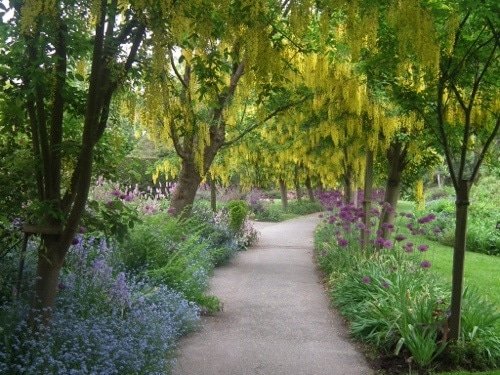
You never know what you might encounter at Vancouver’s VanDusen Botanical Garden. From the strikingly beautiful rammed earth wall that hugs the “living building” at the entrance, to the breathtaking laburnum walk in spring, the display of roses in summer and the brilliant fall foliage of the Japanese maples that surround Heron Lake, this city garden entices exploration, no matter what the season.

“You can see something different every day of every year,” says Nancy Wong, director of marketing and communications. And she should know. Wong has been with the garden for 16 years, and when we rounded a bend in the path on our walk through the Sino-Himalayan area last week, an unexpected patch of blue poppies took her breath away — as well as mine! Head gardener Gerry Gibbens told us he had been looking for just the right place for these fussy plants for 30 years, and this year, lucky for us, he found it.
In the video, head gardener Gerry Gibbens talks about the blue poppies in the Sino-Himalayan Garden.

The 55-acre VanDusen Garden, with its five lakes, four waterfalls, 65 species of birds and many distinct gardens, is all about discovery. School children take part in educational programs such as “pond peering,” where they lie on their tummies and gaze into the water from the decks of a floating boardwalk, exclaiming at the dragonflies, damselflies and fish they can spy.
Plant lovers start lining up at 6 a.m., and often earlier, to find and bring home great new plants at the VanDusen’s annual plant sale, which takes place the last Sunday in April. And techno-junkies (like me, if I were fortunate enough to live here) sign up for courses that teach them how to take great photos with an iPhone.

But the easiest thing to discover at the VanDusen is beauty. The colourful borders and beds of the perennials and heritage rose gardens, the lushly textured plants surrounding Heron Lake, the clipped hedges of the maze and the natural beauty of the birds, bees and insects that make the garden their home: this is what visitors will discover at the VanDusen.
VanDusen videos
Communications Director Nancy Wong tells about the “Transformation Plant” sculpture at VanDusen.
At VanDusen, head gardener Gerry Gibbens talks about the blue poppies in the Sino-Himalayan Garden.


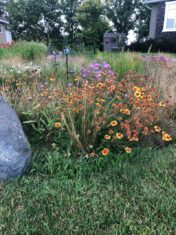
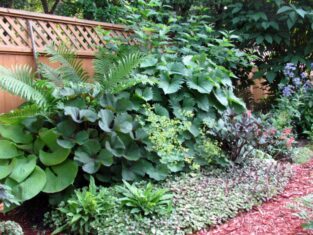
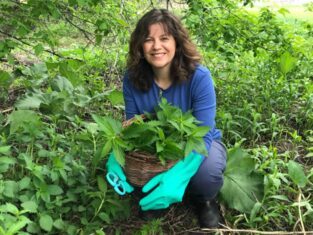
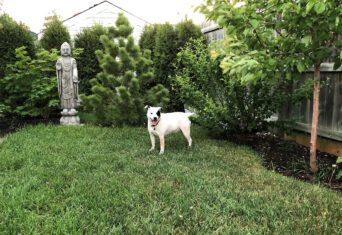
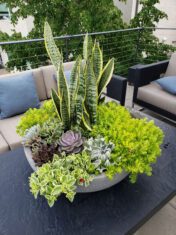
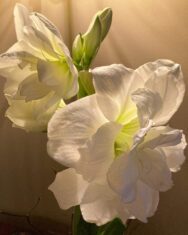

Successfully growing those finicky blue poppies seems to be many a gardener’s ultimate challenge. I even saw them featured in several display gardens at the Chelsea Flower Show–though not in the quantities shown here.
Thanks Dan — happy to have you along for the e-tour!
Great shot of the weeping laburnums contrasting nicely with the purple allium! I’m enjoying your garden journey across Canada immensely. Love it!
I am sooo happy for Gerry at Van Dusen Botanical Garden. I have only once had success with my meconopsis. I had babied it for 3 years and it bloomed once. But I will try again.
I am going to contact Gerry to congratulate him on his beautiful blossoms.
Locally, I rely on the experts at the Nova Scotia Rock Garden Club for local research. They are very, very good. This garden is associated with the Nova Scotia Agricultural College, part of Dalhousie University. The teaching staff at the University have the facilities to conduct plant hardiness studies for our community.
So, Lorraine, be prepared to be Maritime Gardenated. BAMM! That is something we share with coastal communities like that in British Columbia. Cool humid moderate climate. Many of Halifax Public Garden material is able to thrive only because of our humid winters. Weird science.
Hi Helen,
Thanks for your comments about the blue poppies. Consider me Maritime Gardenated!
Best,
Lorraine